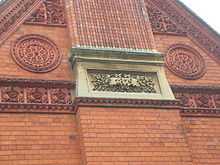Highbury, Birmingham
| Highbury Hall | |
|---|---|
 Highbury Hall | |
| General information | |
| Type | Mansion |
| Architectural style | Arts and Crafts |
| Location | Moseley, Birmingham, England |
| Completed | 1878 |
| Renovated | 1984 |
| Owner | Birmingham City Council |
| Technical details | |
| Floor count | 3 |
| Design and construction | |
| Architect | John Henry Chamberlain |
| Awards and prizes | Grade II* listed |

Highbury, also known as Highbury Hall,[1] now a Grade II* listed building,[2][1][3] was commissioned as his Birmingham residence by Joseph Chamberlain in 1878,[1] two years after he became member of parliament for Birmingham. It received its name from the Highbury area of London, where Chamberlain lived as a child. The architect was John Henry Chamberlain (no relation)[4] who incorporated much terracotta decoration.
Joseph Chamberlain lived in Highbury from 1880 until his death in 1914. During World War I, it was used as a hospital annex and home for disabled soldiers. It was given to trustees in 1919 by his elder son and it then passed to Corporation of Birmingham in 1932, when it was used as a home for elderly women. In 1984, it was restored by Birmingham City Council and is now used as a conference centre and occasional restaurant.[1] The living rooms and bedrooms are open to viewing by clients.
The grounds of the hall now form Highbury Park,[5] a publicly accessible area of Grade II listed[4] parkland.[5]
References
- ↑ 1.0 1.1 1.2 1.3 Birmingham City Council. "Highbury Hall". Birmingham.gov.uk. Retrieved 15 February 2010.
- ↑ Historic England. "Highbury Hall (Grade II*) (1076076)". National Heritage List for England. Retrieved 26 March 2015.
- ↑ Historic England. "- Grade II* (217837)". Images of England.
- ↑ 4.0 4.1 Historic England. "Highbury Hall gardens (Grade II) (1001203)". National Heritage List for England. Retrieved 26 March 2015.
- ↑ 5.0 5.1 Birmingham City Council. "Highbury Park". Birmingham.gov.uk. Retrieved 15 February 2010.
External links
Coordinates: 52°26′31″N 1°54′04″W / 52.44194°N 1.90111°W
| ||||||||||||||||||||||||||||||